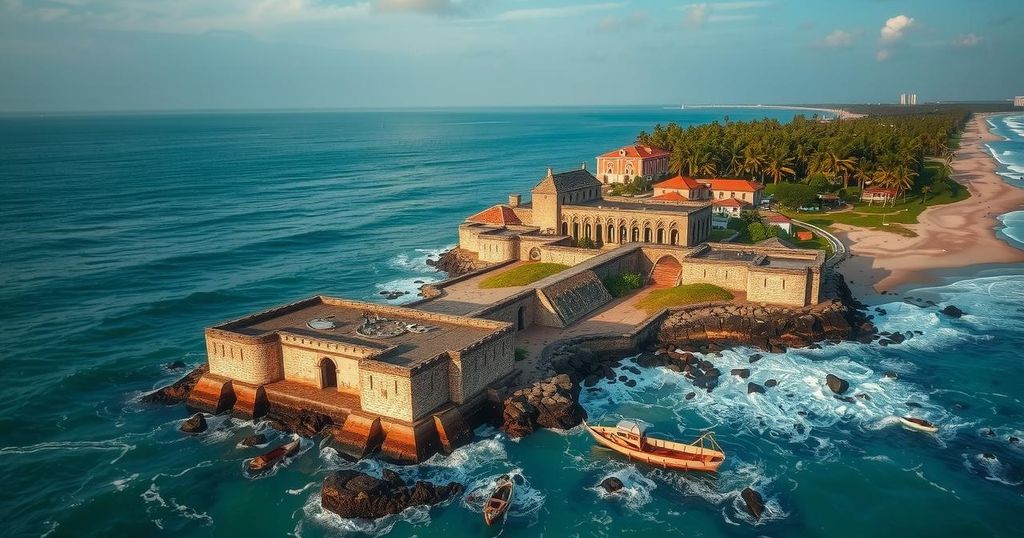Ghana’s Historic Coastal Forts Peril Due to Climate Change
Ghana’s historic forts along its coastline are disappearing due to severe tidal erosion, a consequence of climate change. Coastal communities are also at significant risk. Notable forts like Fort Prinzenstein have been severely damaged, with efforts underway to construct protective measures and restore coastal resilience.
Ghana is facing a critical loss of its historical forts along the 550-kilometer coastline due to destructive tidal waves originating from the Atlantic Ocean. These fortifications, significant reminders of the country’s colonial past, are now succumbing to the accelerating forces of climate change, which cause rising sea levels and intensified coastal erosion. It is reported that Ghana loses, on average, two meters of coastline each year, with certain regions experiencing losses upwards of 17 meters, as determined by research conducted by the Institute for Environment and Sanitation Studies. Various coastal communities, including those adjacent to these historic sites, are also at risk of vanishing entirely. An example is Fort Prinzenstein, a 240-year-old structure located in Keta, Volta Region. Caretaker James Ocloo Akorli shared alarming details regarding the fort’s condition, indicating that two-thirds of it has been submerged by the ocean in the wake of relentless tidal assaults. He revealed that most of the fort’s dungeons, which historically housed enslaved Africans during the trans-Atlantic slave trade, are now underwater due to the catastrophic conditions. Similarly, the 18th-century Fort Kongenstein, once a prominent slave trading post, has completely disappeared, leaving no discernible trace as the ocean claims the land. Fort Fredensborg, also suffering significant erosion, remains barely recognizable while local communities such as Fuveme and Anlo village have been deeply impacted, leading to the displacement of residents. To counteract the effects of coastal erosion, significant measures are being implemented. The Keta Sea Defence Wall, an 8.3-kilometer project initiated over ten years ago and funded by the United States Export-Import Bank (EXIM Bank) at the cost of $94 million, seeks to protect these vital historical sites. Furthermore, a supplementary project titled the West Africa Coastal Areas Resilience Investment Project has recently commenced. This ambitious initiative, backed by the World Bank with a funding of $155 million, aims to restore and enhance the resilience of Ghana’s coastal ecosystems, specifically targeting the challenges faced in significant areas such as the Korle Lagoon and Densu Basin.
The vulnerability of Ghana’s coastal heritage to climate change is exemplified through the gradual erosion and loss of its historical forts, which serve as important monuments of the country’s history, particularly in relation to the trans-Atlantic slave trade. The impact of rising sea levels and increased tidal activity threatens not only physical structures but also the very communities that have coexisted with these historical sites. Local legends, histories, and community identities are intrinsically tied to these landmarks, making their loss significantly impactful. The urgent need for intervention underlines the broader discourse surrounding climate change and heritage conservation in vulnerable regions.
In conclusion, Ghana’s historic coastal forts are being irreparably lost to the advancing tide brought on by climate change. The destruction of these forts signifies not only a physical loss of heritage but also a cultural and historical erosion that impacts local communities. The ongoing initiatives to construct defensive barriers and restore coastal areas are steps toward mitigating these dire consequences, emphasizing the urgent necessity for adaptive measures in the face of climate change.
Original Source: www.rfi.fr




Post Comment